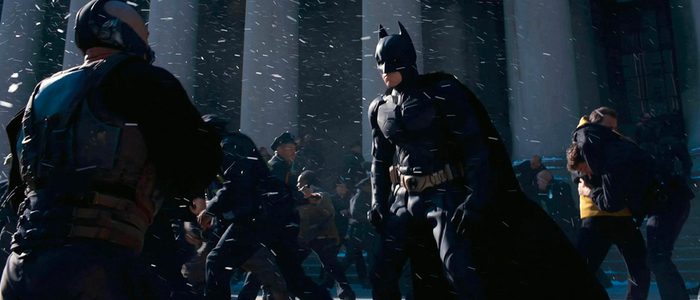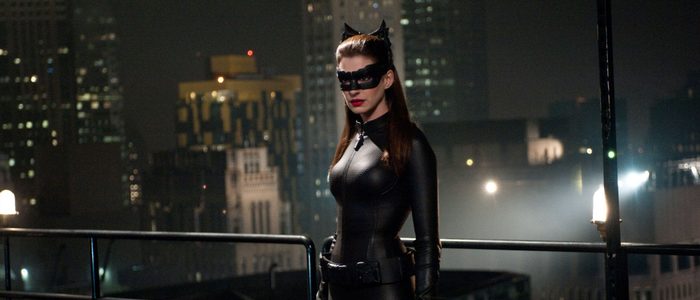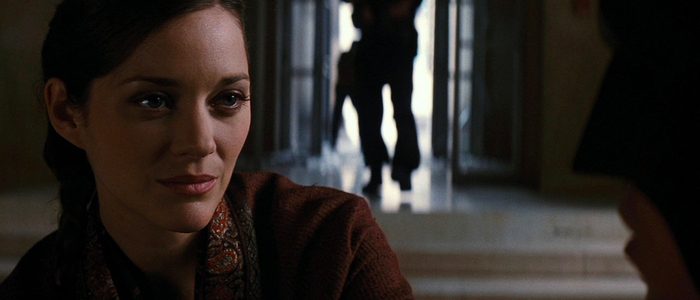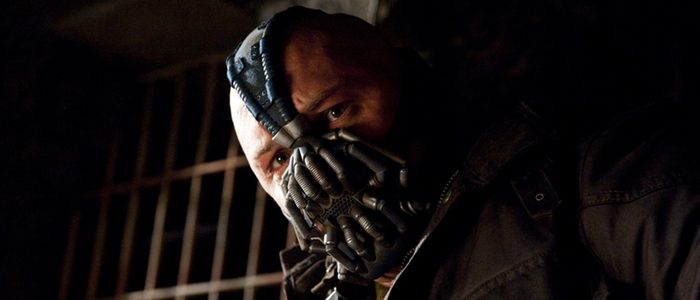The Unpopular Opinion: 'The Dark Knight Rises' Is The Most Ambitious Superhero Movie Ever Made
(Welcome to The Dark Knight Legacy, a series of articles that explore Christopher Nolan's superhero masterpiece in celebration of its 10th anniversary.)(The Unpopular Opinion is a series where a writer goes to the defense of a much-maligned film or sets their sights on a movie seemingly beloved by all. In this edition: we sing the praises of Christopher Nolan's somewhat misunderstood Dark Knight follow-up The Dark Knight Rises.)
"I see a beautiful city and a brilliant people rising from this abyss." – Jim Gordon (and Charles Dickens).
How do you follow up The Dark Knight? The movie changed the face of superhero cinema, and became almost instantly iconic. Another sequel wasn't just required, it was practically demanded by audiences. Director Christopher Nolan had several choices – he could forge ahead with a sequel that copied the layout of The Dark Knight, he could create something completely new, or he could walk away entirely.To Nolan, the third option seemed most appealing. Despite all the success, despite all the acclaim, the director wasn't exactly keen making a third film in his Batman series. But over time, Nolan began to form a plan. A plan that seems almost insane in our current age of never-ending superhero sagas: he would craft a conclusion. A film that would actually bring the story he started back with Batman Begins to a close. That film was The Dark Knight Rises.
The Legend Ends
"Endings are very important," Nolan said. "I don't embark on a project if I don't have a very strong sense of how things are going to end. That's been the case with all three films, and very much so with The Dark Knight Rises – because the entire story arc is ending with this film."The end result was a box office hit, and critics praised it as well. But over time, The Dark Knight Rises developed a bit of a bad reputation. Fans were disappointed with the film. Especially as a follow-up to The Dark Knight.But The Dark Knight Rises is a borderline masterpiece. I'd even go as far as to say that without a few admittedly poor choices here and there, the movie would be better than The Dark Knight. It is the most ambitious superhero movie ever made. The most dense, the most thoughtful, the most somber. It is more than a comic book movie – it's a great novel condensed into an action film. Nolan and brother/co-wirter Jonathan Nolan drew upon Charles Dickens' A Tale of Two Cities in crafting their story, and that's exactly the type of story The Dark Knight Rises feels like. An epic historical novel that just happens to feature Batman.In addition to this, Nolan would bring his Batman series to a definitive close. Rumor has it that executives at Warner Bros. weren't thrilled with this – Nolan's bat-films were a cash-cow, and to close them forever would mean the loss of future profits. But Nolan had developed so much clout at this point that he was able to do whatever he wanted. And what he wanted to do was end it all. "THE LEGEND ENDS" screamed the taglines for the film, and they weren't exaggerating.It's bizzare to think how weird this seems. Stories, by their nature, should have endings. But we as moviegoers have been so conditioned to accept a world of franchises and sequels that it seems like nothing ever really ends. But Nolan didn't operate under this philosophy. Nolan's Bat-franchise wasn't forging a path like the Marvel Cinematic Universe. It wasn't a part of a larger whole. It was a self-contained story, with a clear beginning, middle and end. Few franchises since would adopt such a concept.The Dark Knight Rises picks up eight years after the events of The Dark Knight. Gotham is in a time of unprecedented peace. Crime is virtually non-existent. And so is Batman. The caped crusader has gone into hiding ever since taking the rap for the death of Harvey Dent.Dent is hailed as a folk-hero in Gotham, and the eight years of peace and prosperity have all been built around the lie of his goodness. But the lie can only last so long. Because Gotham is rotting from the inside – literally. Deep within the sewers, masked mercenary Bane (Tom Hardy) has amassed an army. An army that wants to reduce Gotham to ashes.Making Bane the main villain of Rises was highly unexpected. Most fans assumed Nolan would go with a more recognizable villain, like The Riddler or The Penguin. Instead, he wanted someone who could be physically imposing against Batman.Much has been said about Tom Hardy's strange voice, but Hardy deserves acclaim, not scorn, for his portrayal. Following-up Heath Ledger's iconic, Oscar-winning Joker wasn't an easy task. But Hardy took the challenge and ran with it. Yes, his voice is strange – but so what? In Hardy's hands (and rippling muscles), Bane is terrifying. He's a hulking, calculating killer. The Joker thrived on anarchy, but Bane is much more mannered; more sophisticated. "I will kill you," he casually and calmly tells one of his henchmen – and then does it.Bane is also a master manipulator. It would be silly and false to claim that Nolan was somehow predicting the 2016 presidential election when he made The Dark Knight Rises, but ultimately, Bane is like a more well-spoken Donald Trump. He wants to make Gotham great again. He delivers big, loud speeches about giving power back to Gothamites who feel they've been forgotten. And of course, it's all lies. Any sane person should be able to tell that this deranged individual is full of shit – and yet, he manages to prevail. It's eerily familiar to the events of 2016.Bane gains control of Gotham, and breaks Batman in the process. The second half of the film involves Batman returning to his city, saving the day, and sacrificing himself in the process. The Batman and Bruce Wayne of the Nolan films is willing to give up his fight if it means saving his city. The Batman of the comics would never quit – this is a sticking point for many fans. But it's important to remember that Nolan's Batman isn't the Batman of the comics.As Bruce Wayne (Christian Bale) himself says, his Batman was always meant to be a symbol. Batman wears a mask not to just hide his identity, but to also indicate that anyone – anyone at all – could be Batman.Of all of Nolan's Batman movies, The Dark Knight Rises is the entry that seems to fully embrace its comic book trappings. Introducing Selina Kyle/Catwoman into the mix doesn't fit with the world that Nolan seemed to building in The Dark Knight, but it doesn't matter because Anne Hathaway is just so damn good.In a sane world, Hathaway's Catwoman performance would've received just as much awards season attention as Ledger's Joker. The actress is puurfectly cast – able to switch up her demeanor at will. Nolan doesn't play up the character's sexiness the way Tim Burton did with Batman Returns, but Hathaway brings her own alluring attitude to the part. The sexiness with her Catwoman resides in her confidence, and the cocky way she responds to things. When we first meet her, she's posing as a harmless maid at Wayne Manor. When recluse Bruce Wayne sees through her ruse, she instantly switches personas, turning into a more confident, more devious character. As this happens, Hans Zimmer's score delivers a slinky, alluring Catwoman theme that never fails to entertain (Zimmer's soundtrack here in general is phenomenal, and the best music of the entire trilogy).Hathaway's Catwoman is a lower-class Gothamite who at first believes in Bane's "Make Gotham Great Again" scheme. But once she sees how brutal, and how dangerous, Bane is, she changes her tune. She wants out. But she can't get out. Gotham is blocked off – the bridges blown, every exit sealed. And of course, there's a ticking time bomb somewhere in the city. A nuclear reactor that will level Gotham and everyone in it.
A Beautiful City and a Brilliant People Rising from This Abyss
All of this unfolds with a sweeping element of drama that no other comic book movie since has been able to match. Just as The Dark Knight didn't feel like a superhero movie so much as it did a crime film, The Dark Knight Rises feels more like an epic drama. Nolan is drawing in the French Revolution, and A Tale of Two Cities to the extreme here – kangaroo courts, revolution in the streets, executions en masse (people are forced to walk across the frozen Gotham river, only to plummet to their death).I can't recall a single comic book film that attempts to pack so much into one narrative, and does so with such ease. Not even the recent Avengers: Infinity War, with its hundreds of characters, comes close. What makes Rises so astounding is that Nolan loads the film up with so much story, and yet none of it seems forced, or rushed, or crammed.While Bruce Wayne gets more of an arc here than he did in The Dark Knight, he's not the only protagonist of Rises. He shares that duty with John Blake (Joseph Gordon-Levitt), a beat cop who just happens to know that Bruce Wayne is really Batman. I remember some complaints about this – "How could some random cop know the truth about Batman?" But honestly, anyone who happened to be paying attention in Gotham could've picked up on this. Batman didn't appear in the city until after Bruce Wayne, long missing, returned home. It's kind of obvious.Gordon-Levitt's Blake is a great addition to the franchise. He's an idealistic young man who still believes in Gotham, and Batman. Commissioner Gordon (Gary Oldman), is slowly being eroded from the inside, like Gotham itself, for covering up the lies about Harvey "Two-Face" Dent. But Gordon is the past. Blake is the future. The hope that Gotham needs. An orphan who is ready to save his city, no matter what.By the end of the film, Blake is about to assume the mantle of Batman. He's about to become the symbol Gotham needs. There's a poetry in this – that Batman is whomever Gotham needs him to be. Bruce Wayne's time as the Dark Knight has come to an end. John "Robin" Blake's is just beginning.The Batman in The Dark Knight Rises is a legend. A folkloric hero whispered about by school children. "Do you think he's coming back?" one asks. They doodle his symbol in chalk on walls. The city needs Batman – in any shape and form. It doesn't have to be Bruce Wayne – it just has to be someone, anyone, willing to fight for what's right. Again, this goes against almost everything established in the comics, where Batman seemingly must be Bruce Wayne. But that's not the type of story Nolan is telling. He's trafficking in myth, and legend. He's painting a with a much broader brush. He's painting a masterpiece.
The Slow Knife
But does it all work? No. There's one specific plotline that hinders The Dark Knight Rise. A plotline that, had it been removed, would've resulted in a film better than The Dark Knight. And I'm sure you can guess what it is – the Miranda Tate plotline.When Marion Cotillard joined the Rises cast, internet speculation immediately began assuming she would be playing Talia al Ghul, daughter of Ras al Ghul, the villain from Batman Begins. Everyone involved with the film – including Cotillard – denied it. But in the end, the obvious was true – Cotillard's character, Miranda Tate, was actually Talia in disguise – seeking revenge for her father's death.There are a few key reasons why this just doesn't work. First and foremost: it ties Rises too tightly to Begins. One of The Dark Knight's strengths was its ability to stand on its own. If you hadn't seen Batman Begins, you'd still have a firm grasp on what was happening. Rises doesn't unfold like that. It's so reliant on previous entries, primarily Begins, that it suffers.The second reason this doesn't work is because it's just so damn predictable. We know it's coming the minute Cotillard shows up, and we're just waiting for it to happen. And the third reason it fails is that it ultimately robs Bane of much of his power. Hardy's Bane remains a formidable, scary foe for almost the entire film. But the minute Talia reveals herself, Bane is suddenly just a flunky. A hapless henchman. Almost all of his menace is gone.It doesn't help that Cotillard's performance leaves a lot to be desired. When she fully turns into Talia, she decides to embrace her evilness tenfold, delivering each line as if she were a Bond villain revealing a dastardly plan for world domination.Had The Dark Knight Rises removed Miranda Tate/Talia entirely, the film would flourish. On top of that, it would play out almost the same exact way. On top of all that, adding Talia into the mix smacks of fan service – something Nolan never seemed particularly interesting in before. I want to shout back in time to Nolan: "Nix the Talia stuff! Save the film!" Alas, it's not to be.
A Far, Far Better Thing
And yet, despite this major flaw, The Dark Knight Rises triumphs. Here is Nolan applying everything he's learned from these Bat-films, and using it to the extreme. The chase sequences, scored by Zimmer's pulse-pounding music, are breathtaking. The filmmaker stages a raid on the stock exchange that gives way to a motorcycle chase, and we're there with him every step of the way. The climactic chase, in which Batman flies his bat-plane to try to stop Talia, is exhilarating.At one point, Bruce Wayne ends up in a prison pit. He must climb out of the pit – with a broken back, to boot – to return to Gotham. Is this ludicrous? Yes, it is. But god damn it, it works. Nolan baits us, twice – showing Bruce trying, and failing, to climb out of the pit. When he finally does it – as the prisoners below all chant – it's a stand-up-and-cheer moment. Bruce has overcome his physical and mental demons. He's crawled out of hell. He's headed back to save his city.Then there are the smaller moments – Batman and Catwoman fighting side-by-side on a rooftop; Bane casually laying a hand on his financer (Ben Mendelsohn!) to show he has complete control over him; Catwoman throwing out the line "I guess we're both suckers" before she and Batman share a big, passionate kiss; Michael Caine's Alfred weeping at Bruce Wayne's grave, devastated he's failed him; and the haunting moment where Batman flies the nuclear bomb out to sea, and the people of Gotham watch as a mushroom cloud forms in the distance.It culminates in a thing Nolan does so well – the closing montage. We watch as order is restored to Gotham. We watch as John Blake discovers the Batcave. We watch as Alfred heads off to Italy and learns that Bruce Wayne is, in fact, still alive, and living it up with Selina Kyle. And of course, Gordon reading from A Tale of Two Cities. Reading a passage from the end of the book that sums up the entire film so brilliantly:"I see a beautiful city and a brilliant people rising from this abyss. I see the lives for which I lay down my life, peaceful, useful, prosperous and happy. I see that I hold a sanctuary in their hearts, and in the hearts of their descendants, generations hence. It is a far, far better thing that I do, than I have ever done; it is a far, far better rest that I go to, than I have ever known."Nolan closed his Dark Knight Trilogy on a finite note. Sure, Warner Bros. could've kept it going with Joseph Gordon-Levitt in the lead, perhaps. But it's clear that's not Nolan's concern here. He was done with Batman once and for all. It was his far, far better thing, and he was going off to a far, far better rest (or at least a well-earned vacation). Bigger, more personal films would follow. And the Dark Knight trilogy would stand on its own. No other comic book franchise has ever come close to equaling it. No other comic book franchise ever will.
